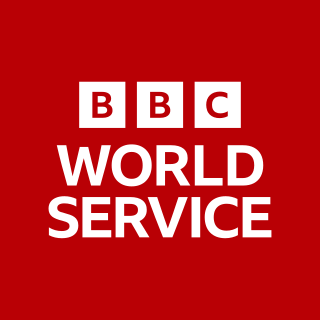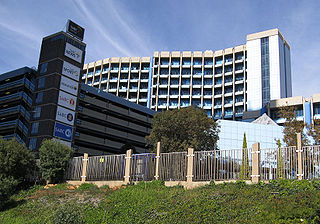
Botswana, officially the Republic of Botswana, is a landlocked country in Southern Africa. Botswana is topographically flat, with approximately 70 per cent of its territory part of the Kalahari Desert. It is bordered by South Africa to the south and southeast, Namibia to the west and north, Zambia to the north and Zimbabwe to the northeast. With a population of slightly over 2.4 million people and a land area similar to France, Botswana is one of the most sparsely populated countries in the world. It is essentially the nation-state of the Tswana people, who constitute nearly 80 per cent of the population.

The BBC World Service is an international broadcaster owned and operated by the BBC. It is the world's largest external broadcaster in terms of reception area, language selection and audience reach. It broadcasts radio news, speech and discussions in more than 40 languages to many parts of the world on analogue and digital shortwave platforms, internet streaming, podcasting, satellite, DAB, FM and MW relays. In 2024, the World Service reached an average of 450 million people a week. In November 2016, the BBC announced that it would start broadcasting in additional languages including Amharic and Igbo, in its biggest expansion since the 1940s.

Mahikeng, formerly known as Mafikeng and alternatively known as Mafeking, is the capital city of the North West province of South Africa.

Gaborone is the capital and largest city of Botswana with a population of 246,325 based on the 2022 census, about 10% of the total population of Botswana. Its agglomeration is home to 421,907 inhabitants at the 2011 census. Gaborone has per capita income of US$32,000 (PPP), the highest in Africa.
Public broadcasting involves radio, television, and other electronic media outlets whose primary mission is public service. Public broadcasters receive funding from diverse sources including license fees, individual contributions, public financing, and commercial financing, and claim to avoid both political interference and commercial influence.

The South African Broadcasting Corporation (SABC) is the public broadcaster in South Africa, and provides 19 radio stations (AM/FM) as well as six television broadcasts to the general public. It is one of the largest of South Africa's state-owned enterprises.

The Zambezi Region is one of Namibia's fourteen regions, situated in the north-eastern part of the country along the Zambezi River where it gets its name from. The region's capital is the town of Katima Mulilo. The Katima Mulilo Airport is 18 kilometres south-west of the town, while the village of Bukalo is located 43 kilometres south-east of Katima Mulilo. Formerly known as the Caprivi Region until 2013, it has eight electoral constituencies and a population of 142,373 according to the 2023 census.

Sir Seretse Goitsebeng Maphiri Khama, GCB, KBE was a Botswana politician who served as the first President of Botswana, a post he held from 1966 to his death in 1980.

The Bechuanaland Protectorate was a protectorate established on 31 March 1885 in Southern Africa by the United Kingdom. It became the Republic of Botswana on 30 September 1966.
Botswana is an African country made up of different ethnic groups, although Batswana are the majority of the population. Music is a large part of Botswana culture, and includes popular and folk forms. Botswana church choirs are common nationwide.

There are several different types of mass media in the United Kingdom: television, radio, newspapers, magazines and websites. The United Kingdom is known for its large music industry, along with its new and upcoming artists. The country also has a large broadcasting, film, video games and book publishing industries.

Besides referring to the language of the dominant people groups in Botswana, Setswana is the adjective used to describe the rich cultural traditions of the Batswana - whether construed as members of the Setswana ethnic groups or of all citizens of Botswana. the Batswana believe in the rich culture of Botho-Ubuntu, ‘‘People are not individuals, living in a state of independence, but part of a community, living in relationships and interdependence.’ Batswana believe in working together and in being united.

The Mauritius Broadcasting Corporation (MBC) is the national state broadcaster of the Republic of Mauritius, that is the islands of Mauritius, Rodrigues, and Agaléga. The historical headquarters in Curepipe were relocated in Réduit, Moka. It also operates a station in Rodrigues. The MBC programmes are broadcast in 12 languages, notably French, Creole, English, Hindi, Urdu, Bhojpuri, Tamil, Telugu, Marathi, Mandarin/Cantonese, and Hakka. MBC provides 17 television channels in Mauritius, four in Rodrigues and two in Agaléga, as well as seven radio channels.

The Ghana Broadcasting Corporation (GBC) was established by law in 1968 with a triple mandate as a State Broadcaster, Public Service Broadcaster, and a Commercial Broadcaster in Ghana. Headquartered in the capital city, Accra, it is funded by grants, broadcasting television commercials and the levying of a television licence, costing 36 cedis and 60 cedis for one or more TV sets in the same house every year. TV set repairers and sales outlets are to pay an annual sum of between 60 cedis to 240 cedis.
The British Broadcasting Corporation (BBC) is a British public service broadcaster headquartered at Broadcasting House in London, England. Originally established in 1922 as the British Broadcasting Company, it evolved into its current state with its current name on New Year's Day 1927. The oldest and largest local and global broadcaster by stature and by number of employees, the BBC employs over 21,000 staff in total, of whom approximately 17,900 are in public-sector broadcasting.

Botswana Television is the national broadcaster in Botswana. Botswana's first national television service started in 2000 following a 1997 government decision. The station delivers thirteen hours of local and international programmes daily on weekdays and 13 hours of programming on weekends.
The history of Gaborone began with archaeological evidence in the area around Gaborone dating back to 400 BCE, and the first written accounts of Gaborone are from the earliest European settlers in the 19th century. Since the 1960s, when Botswana gained its independence from Britain and Gaborone became the capital, the city has grown from a small village in the Botswana scrubland to a major center in southern Africa.

A United Kingdom is a 2016 biographical romantic drama film directed by Amma Asante and written by Guy Hibbert, based on the true-life romance of Seretse Khama, heir to the throne of the Bangwato Tribe in Serowe – one of many tribes found in then Bechuanaland Protectorate – with his wife Ruth Williams Khama. David Oyelowo and Rosamund Pike portray Seretse and Ruth, respectively.

Radio Botswana- abbr RB1 is a radio station in Botswana operated by the Government of Botswana in the capital city Gaborone. The Radio station provides news, current affairs about the country Botswana, the culture of Botswana, education and also provides entertainment to its followers. Radio Botswana station 1 started diffusing to its crowd in the year 1965 and during that time it was initially called the Radio Bechuanaland before the country became independent. During the time it was called Radio Bechuanaland, the station got assistance of wave transmition from the Mafikeng Veterinary, and it served the department with communication covering a circle of 20 miles. The partnership between the Mafikeng veterinary and radio Bechuanaland was to broadcast the agricultural agenda/programmes.
Radio Bechuanaland from the year 1967 was on air at a band of 90 meters every night. The station is called Seroma mowa sa Botswana in Setswana language.

Batswana nationality law is regulated by the 1966 Constitution of Botswana, as amended; the Citizenship Act 1998, and its revisions; and international agreements entered into by the government of Botswana. These laws determine who is, or is eligible to be, a national of Botswana. The legal means to acquire nationality, formal legal membership in a nation, differ from the domestic relationship of rights and obligations between a national and the nation, known as citizenship. The Botswana nationality is typically obtained on the principle of jus sanguinis, i.e. by birth to parents with Botswana nationality. It can be granted to persons who have lived in the country for a specific period of time, who have performed distinguished service to the nation or who have an affiliation to the country through naturalisation.















